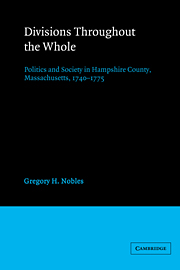Book contents
- Frontmatter
- Contents
- Preface
- Introduction
- 1 Family power and political relations in Hampshire County
- 2 The Hampshire County ministry and the Great Awakening: from revival to reaction
- 3 The revivalist removed
- 4 The legacy of religious dissent
- 5 New settlements in an unsettled society
- 6 The politics of parochialism
- 7 Revolution in the neighborhood
- Appendix
- Notes
- Bibliographical essay
- Index
- Frontmatter
- Contents
- Preface
- Introduction
- 1 Family power and political relations in Hampshire County
- 2 The Hampshire County ministry and the Great Awakening: from revival to reaction
- 3 The revivalist removed
- 4 The legacy of religious dissent
- 5 New settlements in an unsettled society
- 6 The politics of parochialism
- 7 Revolution in the neighborhood
- Appendix
- Notes
- Bibliographical essay
- Index
Summary
Historians may still not be able to explain with certainty–or unanimity – why the American colonists made a revolution, but by now most would probably agree that the roots of the Revolution lay not so much in the changes in British policy as in the changes in American society. This book is a study of local conditions in one small part of that society, a rural county in western Massachusetts, during the years before the Revolution. Throughout the seventeenth and eighteenth centuries, Hampshire County remained distinct from both eastern Massachusetts and Connecticut and in many ways represented a region with its own identity and pattern of development. By the time of the Revolution it contained a wide variety of communities, ranging from old, established towns along the Connecticut River to new, struggling settlements in the hills or on the frontier.
On the one hand, then, I have chosen to examine the changing nature of Hampshire County in the belief that this kind of regional focus provides more complexity and diversity and a generally broader frame of reference than does the study of one particular community. At the same time, though, I have chosen to confine the frame of reference to the county in the belief that it is at the local level that common people most actively and eloquently express their political values. Then, as now, most people did not have the opportunity or the ability to participate directly in international, national, or even provincial politics.
- Type
- Chapter
- Information
- Divisions throughout the WholePolitics and Society in Hampshire County, Massachusetts, 1740–1775, pp. ix - xiiPublisher: Cambridge University PressPrint publication year: 1983

